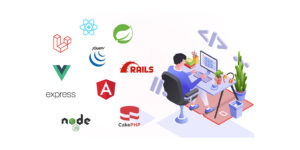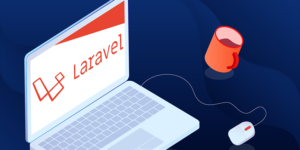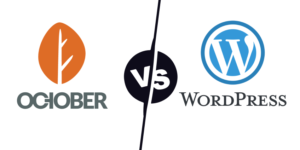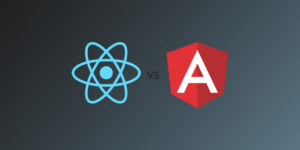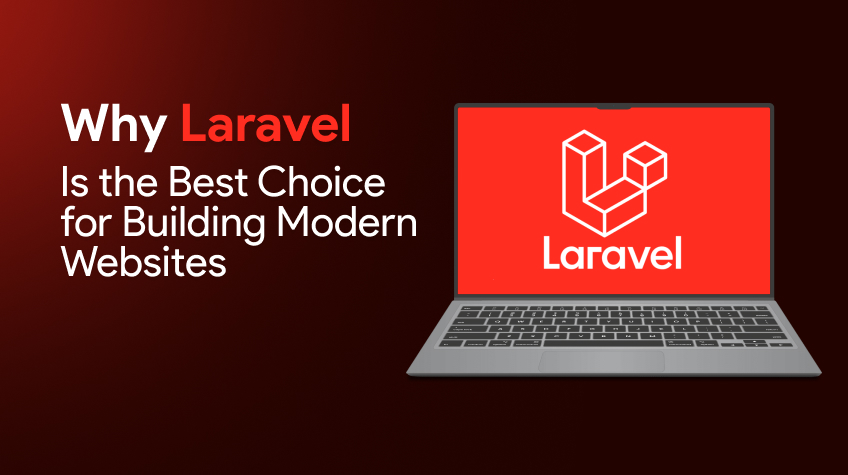
Laravel powers the modern web. Expressive syntax, high security, fast performance, rich ecosystem, and powerful scalability features—all these combine to get you the ultimate PHP framework. Powering millions on the internet, see how Laravel can be the perfect choice for your team.
The internet never sleeps. Nor do the innovations powering millions of websites online. Within this ecosystem, multiple languages and frameworks are trying to take over control to deliver high-performance websites. Among the stars of the show, we have Laravel, one of the leading development frameworks modern developers swear by. It’s fast, reliable, and above all, modular, allowing developers to unleash their full creativity. With over 60,000 stars on GitHub, its popularity can be easily gauged thanks to more than 2.5 million sites that now run on Laravel. But what makes it so ubiquitous? Let’s find out more.
What is Laravel?
In simple words, Laravel is an open-source PHP web application framework that works on the Model-View-Controller pattern. Generally sitting on the backend, Laravel developers often build full-stack applications by pairing Laravel with front-end frameworks like React or Vue.js to give users a modern web experience.
Laravel was created by Taylor Otwell in an attempt to simplify PHP programming for the community. He built it on Symfony components but later added tools that address common pain points. This was primarily aimed at helping devs focus more on writing business logic and not boilerplate code.
Key Features that make Laravel a Developer’s Favorite
➢ Blade Templating Engine
Laravel’s Blade engine is a powerful way to build your views. You get support for template inheritance, integrates super easily with plain PHP, and also lets you define reusable layouts. And since all of this is done without adding any resource overhead, your app remains blazing fast without sacrificing flexibility.
➢ Eloquent ORM
Interacting with your database has become very easy with Eloquent. Database queries are written in PHP instead of SQL, relationships are mapped like one-to-many or many-to-many, and all your tables are treated as native PHP objects. That translates complex SQL into readable, maintainable code.
➢ Artisan Command-Line Interface
Artisan streamlines the entire workflow. You generate controllers, models, and migrations in a few commands. Plus, you also get to schedule background tasks, define custom commands, and much more. And all of this right from the comfort of your terminal. Sounds magical, ain’t it? That drastically accelerates development and automates repetitive tasks.
➢ MVC Architecture
Laravel enforces a clean separation of concerns through its MVC design. Your model handles data, your view handles presentation, and your controller handles logic. This structure improves maintainability, and tests become cleaner. Plus, collaboration is a strong point too. Collaboration among team members becomes more predictable.
➢ Object-Oriented Libraries
Laravel ships with built-in, object-oriented libraries that handle multiple operations. This can include things like authentication and encryption, to caching and validation. So, most of the features are prebuilt. Instead of having to build these features manually, you have well-tested, community-backed components that are just plug-and-play.
➢ Task Scheduling and Queues
Laravel’s built-in task scheduler is a great way to define scheduled tasks (like sending emails or performing cleanup). A single Cron entry on the server triggers your scheduler. Meanwhile, Laravel Queues help defer time-consuming tasks so your app responds faster and uses server resources much more efficiently.
➢ Reverse Routing
Hardcoding URLs is a thing of the past. Instead, you name your routes and generate links dynamically. This high level of flexibility makes maintenance effortless. Why? Because if the URL patterns change, you won’t have to rewrite links across your codebase
➢ Database Migrations and Seeding
Laravel’s Schema Builder helps you build and modify your database schema using PHP. Migrations let your team version-control your database structure. Seeders plus the Faker library lets you populate your database with realistic test data automatically, which saves you from manual or error-prone setup.
➢ File storage and cloud integration

Laravel’s integration with the Flysystem PHP package is a godsend. You store files locally, on Amazon S3, Google Cloud, or other platforms with ease. With Laravel, you also get support for signed URLs and secure paths so that you have the option of safely publishing or hiding files as needed.
➢ Localization and internationalization

With Laravel, you have support for multilingual apps via translation files. You use helper methods like __() to fetch the right text for each locale and middleware to switch language based on user preference, making Laravel fully ready to power global applications.
Why Laravel for Modern Web Development?
➢ Developer efficiency and reduced costs
It is no secret that Laravel saves time. With its modular structure, prebuilt libraries, Blade templates, and Artisan CLI, devs are able to create a fast, lean development flow. Developers can launch features quickly, write less boilerplate, and maintain code much more cleanly. The speed gains translate into lower operational costs and smoother collaboration between teams.
➢ A mature and evolving ecosystem
Laravel’s ecosystem is continuing to grow at a staggering pace, and with tools like Forge (for server provisioning), Vapor (for serverless hosting on AWS), Nova (for admin dashboards), and Envoyer (for zero-downtime development), you quickly understand why Laravel fits so perfectly well with real-world workflows. Plus, you also have an active community that contributes packages, tutorials, and support to keep Laravel fresh and in pace with modern development philosophy.
➢ API-First Architecture
API building with Laravel is quite a straightforward process. You get resource controllers, token-based authentication via Sanctum or Passport, consistent JSON response transformers, and rate limiting. These are essential features that help you build backends that serve mobile apps, web apps, IoT devices, or any other client that needs secure, scalable access.
➢ Scalability and performance
Laravel handles high-traffic applications well. It plugs into caching systems like Redis, supports OPcache, and leverages queues to manage expensive jobs. With Laravel Octane and Swoole, you can handle thousands of concurrent requests. For serverless scale, Vapor allows you to deploy apps to AWS without managing servers, delivering elasticity during traffic spikes.
➢ Real-time and microservices support
If you need a distributed, event-driven architecture, Laravel provides a powerful message queue system, event broadcasting, and queue abstractions that work consistently across different backends. Microservices can be baked in quite easily with Lumen (Laravel’s lightweight sibling). Asynchronous communication is supported via brokers like RabbitMQ and Kafka. All of this combines to offer you a fault-tolerant, scalable system.
➢ Progressive Web App (PWA) Enablement
Expect seamless integration with front-end tools like Vue.js or Inertia.js to build progressive web apps. Devs get offline support and much faster load times with a Laravel backend you have total control over.
➢ Enterprise-grade security
Laravel embeds robust security by default, defending against multiple online offenses, including but not limited to SQL injection, cross-site scripting, cross-site request forgery, and more. Other security standards, like secure password storage manager, rate limiting, 2FA, and email verification that keep you safe, following the latest security standards.
➢ Long-term stability
Laravel provides Long-Term Support (LTS) releases. Think of these as stable versions that are officially supported by the creator team. You get regular bug fixes and security upgrades for years. Such a long-term roadmap gives businesses confidence in building on Laravel.
A Forward-Looking Framework
With every major release, Laravel continues to evolve, be it improving query builders, task batching, or DevOps integrations. And every upcoming version promises even more real-time tools. It is an ecosystem that remains unmatched. An ecosystem that helps teams develop and manage without building everything from scratch. An ecosystem powered by a massive community.
Despite getting some serious competition from other PHP frameworks, like Yii or CodeIgniter, Laravel gets you a very rare and real balance of developer productivity, performance scaling, enterprise-grade tools, robust security, and long-term support. And that is the precise reason why startups and large companies are opting to take the Laravel route.

